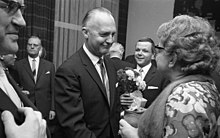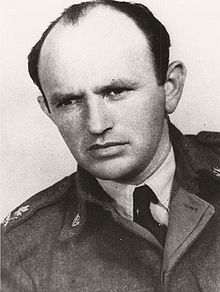Heroes without a home
| Movie | |
|---|---|
| German title | Heroes without a home |
| Original title | Heroes Without a Home - The Jewish Brigade |
| Country of production | Germany |
| original language | German |
| Publishing year | 2003 |
| length | 53 minutes |
| Rod | |
| Director | Susanne Stenner |
| script | Susanne Stenner |
| production | Stenner film |
| music | Peter W. Schmitt |
| camera | Peter Schumann |
| cut | Miriam Weinandi |
Heroes without a home - The Jewish Brigade is a German documentary film from 2003, which was produced by ZDF with a length of 53 minutes, for the first time on Wednesday, November 12, 2003 on ZDF , and then again on March 11, 2007 appeared in Arte . The film documents the formation and work of the Jewish infantry brigade , which was formed by Winston Churchill at the request of the Yishuv and which was part of the British Eighth Army . Although these 5,000 Jewish soldiers officially served the British Crown , the Jewish Brigade secretly obeyed the commanders of the Hagana and illegally assisted in the Bricha .
- 1945 Northern Italy
In spring 1945 the Jewish brigade was deployed in northern Italy. Stenner says:
“And their story begins here: In the spring of 1945. Northern Italy. The Jewish brigade is deployed here. All come from Palestine, the British Mandate Area. They speak Hebrew, wear the Star of David on their uniform and they are part of the British Eighth Army. Jewish soldiers have been fighting on the Allied side since the beginning of the war, but a purely Jewish unit is new. The Yishuv, the representative of Jewish politicians in Palestine, wrested this brigade from the British government. "
Heini Bornstein - member of the Zionist movement Hashomer Hatzair - thinks that the Jewish brigade was the first recognized national formation of the Zionist idea.
- "[…] Revenge […]"
The soldiers of the Jewish brigade were also looking for Nazi perpetrators and held court martial. They acted in the spirit of revenge without having received an order, neither from the Hagana nor from the Jewish brigade. Stenner says: “They were Jewish brigade soldiers and members of a secret vengeance squad. They searched for and judged Nazi murderers: Chaim Miller and Olli Givon . About 20 Nazi perpetrators have to answer before the court martial. The Avengers act on their own behalf, neither as brigade men nor as members of the Hagana, the underground military organization. But they are always sure who they are accusing ”.
- "[...] Searching for clues in the Public Record Office (PRO) in London [...]"
On the “search for clues in the Public Record Office (PRO)”, Stenner searches for the acts of revenge and the history of the Jewish brigade and learns that the British War Department did not mention the acts of revenge. Stenner says: “We want to know whether the avengers' actions have been put on record. But all documents concerning the Jewish brigade are silent on the subject of revenge ... ”. But the documents show that the British government was aware of the illegal refugee aid provided by the Jewish soldiers. The government had been informed by the administration of the British Mandate in Palestine . Stenner says: "We find interesting references to other illegal actions of the brigade of which the government was aware [...] the warnings from the British administration in Palestine reach the War Department directly [...] the brigade is involved in helping refugees in the British mandate," support illegal immigration, act against British interests ”.
- "[...] revenge or refugee aid [...]"
The soldiers of the Jewish brigade had arrested and shot around 20 Nazi perpetrators on their own behalf. However, this was not tolerated by the Hagana, because it endangered illegal refugee aid. Stenner says: “The Hagana, whose commanders operate within the brigade, must avoid any fuss and prevent acts of revenge. Because revenge threatens to endanger a much more important goal: refugee aid to Palestine ... ”.
- "[...] the British Realpolitik [...]"
However, according to Stenner, the British government acted as a colonial ruler who wanted to maintain peace and order in his mandate and blocked the Bricha . Stenner explains this as follows: “But the rescue of the survivors to Palestine threatens to fail because of British realpolitik. The country is a British mandate. The influx of Jewish refugees and the vehement call for a state of their own jeopardize the colonial rulers' desire for peace and order. The British prevent the survivors from reaching Palestine uncontrolled across the Allied zone border ... ”.
- "[...] Refugees as a means of political pressure [...]"
Stenner describes the refugee aid as politically motivated. The Jewish Brigade as a Zionist organization was interested in obtaining political leverage. A means of pressure to create the future state of Israel . She says: “Like all Zionist organizations, the brigade is fighting for its own Jewish state, but to get it requires strong political pressure ... overcrowded DP camps, overloaded refugee ships and the pressure of public opinion could make the dream of one's own country come true […] Refugees as a means of political pressure […] The Zionist underground organizations work hand in hand to achieve this… ”. Asher Ben-Natan , section head of the Bricha escape organization, says: “The brigade has always helped where it could help to bring refugees to Italy and to the ports of illegal immigrants. The bigger the current, the sooner the borders opened [...] but in the end [...] under the pressure of the refugees the borders opened ... ".
- "[...] the dream of Palestine [...]"
According to Susanne Stenner, “the dream of Palestine in Poland does not have to be renewed by the brigade”. Here Stenner names those who were members of Zionist organizations in the prewar period and who participated in the resistance against the Nazi regime. According to Stenner, these wanted to “tie in with Jewish life”. Therefore, they sought contact with the Jewish brigade. As an example, Stenner gives Chassia Braunstein , who belonged to the Jewish resistance in Białystok and survived the Białystok ghetto and the resistance in Białystok . Braunstein lived with partisans and looked after "orphans of the Holocaust". Thanks to the Jewish brigade, Braunstein managed to immigrate to Palestine together with 500 Polish orphans, where they set up a kibbutz together with Heini Bornstein , a young Zionist leader from Switzerland and her future husband .
- "[...] Double loyalty [...]"
In the summer of 1945, the Jewish brigade chief Ernest Frank Benjamin received a new marching order. He learns that his unit is to be relocated to Belgium and Holland . Susanne Stenner comments on the reasons for the relocation of the Jewish brigade: “For obvious reasons, this unit should not be deployed in Germany, according to internal writings from the War Ministry. British officials know full well that the loyalty of this force belongs to the Star of David and not to the British Crown ”.
- "[...] a possible Jewish state needs soldiers and weapons, the Hagana knows [...]"
In 1945 the headquarters of the Hagana , which was active within the Jewish brigade, was in Paris . Although the Jewish Defense Army was originally founded to protect Jewish agricultural establishments in Palestine, in the post-war period it pursued other goals besides the Bricha in Europe, for which the commander of the Hagana and a man of the Jewish brigade Shlomo Shamir sent his men across Europe. Susanne Stenner comments on the men's mission : "To pursue secret actions [...] a possible Jewish state needs soldiers and weapons, the Hagana knows". Mordechai Gichon, a member of the Hagana, tells how he smuggled money in a sack past the military police and explains about the use of the money: “and was used to buy weapons. We made it possible to bring these weapons through Europe to the coasts of France and to load them there and bring them to Palestine ”.
- "[...] But that is exactly what the British wanted to prevent [...], because having their own military was a first step towards national sovereignty [...]".
In Germany, men of the Jewish brigade posed as displaced persons in order to infiltrate the German DP camps , where, according to Susanne Stenner, they “made policy for Palestine”. According to Eliahu Ben Jehuda , the soldiers of the Jewish brigade received illegal IDs. So Ben Yehuda took the name of a well-known footballer and became headmaster in a DP camp in Bergen-Belsen . There he convinced the young people to emigrate to Palestine in order to "fight for their own country", preparing them for the later military in Israel. Susanne Stenner remarks: "But that is exactly what the British wanted to prevent [...] because having their own military was a first step towards national sovereignty". Possible uses of the Jewish brigade after the war were rejected by the British government. As possible reasons for this, Stenner cites that the brigade, as a Jewish army under the Jewish flag, could have fought for a Jewish state, but the British did not want this. Stenner thinks:
“The proposal by the Jewish politician Moshe Shertok to deploy the brigade as a military unit to Palestine after the end of the war is therefore rejected by the British government. The brigade should be disbanded, so the power word from London. "
However, the soldiers of the Jewish brigade did not all obey this order. So many stayed in Europe to make the Bricha possible for more refugees . Shlomo Shamir explains: “When we were released, a group of 150 men remained in Europe. They gave their uniforms to the refugees, who then came to Palestine on their behalf. Instead of soldiers, refugees came to Palestine ”.
Web links
- kantaratv.de
- Heroes without a home - The Jewish Brigade in the Internet Movie Database (English)
- Heroes without a home in the lexicon of international film
- stennerfilm.de (PDF; 13 kB)

